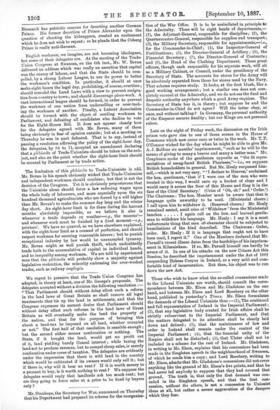The limitation of this plebiscite to Trade-Unionists is odd. Mr.
Bevan in his speech obviously wished that Trade-Unionists and independent workmen should combine; but that is not the decision of the Congress. Yet it is obviously preposterous that the Unionists alone should force a law reducing wages upon the whole body of labourers, and more especially upon the six hundred thousand agriculturists who are forced by a will higher than Mr. Bevan's to make the summer day long and the winter day short. An eight-hour limit is for them during the harvest months absolutely impossible, as we believe it also is whenever a trade depends on weather—e.g., the masons'— and whenever work must be finished by a fixed moment—e.g., printers'. We have no quarrel, as we have elsewhere explained, with the eight-hour limit as a counsel of perfection, and should respect workmen for securing reasonable leisure ; but to punish exceptional industry by law would be unexampled tyranny. Mr. Bevan might as well punish thrift, which undoubtedly tends both to the accumulation of capital in individual hands, and to inequality among workmen. We are told by experienced men that the plebiscite will probably show a majority against legislative restriction, the minority embracing the over-worked trades, each as railway employes.


































 Previous page
Previous page